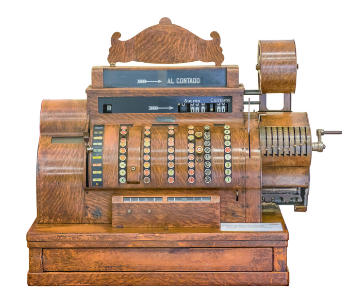What History Can Teach Us About Small Business Bookkeeping
 Did you know that the bookkeeping methodology your small business uses every day is based on a practice that was centuries in the making? In fact, it’s probably safe to say that the concepts behind double-entry bookkeeping were a work in progress for thousands of years!
Did you know that the bookkeeping methodology your small business uses every day is based on a practice that was centuries in the making? In fact, it’s probably safe to say that the concepts behind double-entry bookkeeping were a work in progress for thousands of years!
The financial statements that a double-entry bookkeeping system generates are what keeps your business accountable to banks, investors, and various tax departments. They’re also what allows you to budget and plan.
But while few would argue that double-entry bookkeeping was some pretty ground-breaking stuff for its time – not to mention an infinitely practical system for organizing vast amounts of financial information - there are those who would question the role of the professional bookkeeper going forward. Especially since the advent of artificial intelligence and natural language processing technologies have made it virtually impossible not to speculate about the workplace of tomorrow.
Before we evaluate its future however, we have to consider what history can teach us about small business bookkeeping. And that means exploring what double-entry bookkeeping is, where it came from, and why it’s so essential for business success.
What is Double-Entry Bookkeeping, Anyway?
The notion behind double-entry bookkeeping is deceptively simple: it’s all about equilibrium, and “balancing the books”.
If you picture your company’s financial accounts as numbers forming two columns on a page – a positive column on the left, representing everything your company owns, and a negative column on the right, representing everything it owes (plus whatever’s left over after what it owes has been paid) - the column on the left must always equal the column on the right.
That’s a mathematical truth, and it looks like this:
Assets = Liabilities + Owner’s Equity (net worth)
What this equation essentially tells us is that everything your business ever owns will be paid for by debt (loans), equity (capital), or a combination of both. And to preserve the integrity of the equation, every financial transaction your business engages in - whether it’s the sale of a product, the purchase of supplies, or the payment of wages to an employee - must be recorded as both a “positive” and a “negative” amount. These offsetting figures are what we refer to as debits and credits.
When you sell a $100 product or service to your client, for example, this transaction gets recorded in at least two places in your business accounts. The simplest illustration of this would be:
- a $100 Credit to your Revenue (Sales) Account, and
- a $100 Debit to your Bank (Cash) Account
The tricky part however, is that while debits must always equal credits in a single transaction, some “positive” amounts are considered debits, while others are credits – and the same holds true for their “negative” partners. It’s not unusual for the inexperienced business owner to reverse a double-sided bookkeeping entry – by debiting the account that should have been credited, and crediting the one that should have been debited. Couple this with the distinct possibility of entering offsetting transactions against the wrong accounts altogether, and it’s easy to see why debits and credits can still be in balance, without being where they belong.
So, while our nifty equation may be a long-standing truism, it’s far from foolproof when it comes to preventing human error. Not only can events like the ones described here lead to some serious headaches where your company finances are concerned, they’re just one of the many reasons why engaging a professional bookkeeper is a remarkably wise decision.
Bookkeeping Through the Ages
“Those that innovate the future understand history the best.” - Rick Warren
 When it comes to giving credit where credit is due, not everyone agrees on just how far back the foundations of double-entry bookkeeping go. But despite the impossibility of pinpointing the exact person, place, or event responsible for its birth, history does agree on a handful of notable bookkeeping influences:
When it comes to giving credit where credit is due, not everyone agrees on just how far back the foundations of double-entry bookkeeping go. But despite the impossibility of pinpointing the exact person, place, or event responsible for its birth, history does agree on a handful of notable bookkeeping influences:
- The earliest accounts (no pun intended) of a double-entry method stretch back to the 11th or 12th century trade center of Kaesong, Korea.
- But for hard evidence of this system in action, we must fast-forward to Amatino Manucci’s commercial ledger of 1299-1300. Manucci was an employee of Giovanni Farolfi & Company in France, where he hand-scribed his merchant employer’s accounting records using what is widely accepted as the oldest surviving example of a double-entry bookkeeping system in Europe.
- Where Manucci’s record is only a fragment however, Italy’s Messari (Treasurer’s) accounts of 1340 for the Republic of Genoa contain not only debits and credits in a two-sided format, but account balances carried forward from the previous year. This makes the Messari accounts the oldest, most complete version of a double-entry system to date.
For a comprehensive look at what double-entry bookkeeping was all about in those early years, historians generally turn to Croatian economist, Benedetto Cotrugli (Benedikt Kotruljević). His Book of the Art of Trade – written in 1458, but not officially published until 1573 - contains an appendix that is often cited as the very first description of what amounts to modern accounting.
But because Cotrugli’s work underwent an unfortunate publishing delay, many still claim Italy’s Luca Pacioli as the true “father of accounting”. Pacioli was a Franciscan friar who wrote and published the Summa de Arithmetica, Geometria, Proportioni et Proportionalita in 1494. His was a detailed summary of the double-entry system that would go on to pave the way for traders, merchants, and moneylenders everywhere.
Double-Entry Bookkeeping and the Early Entrepreneur
So, why was double-entry bookkeeping such an incredible innovation? What likely started out as a way for the wealthy to keep tabs on possessions that were bought, sold, or traded, would also have done a great deal to ensure that such inventory changes were authentic - and not the fabrication of some light-fingered scribe.
Beyond just keeping a company’s finances organized and accounted for, double-entry bookkeeping eventually allowed its dealings to be summarized in such a way that every business owner could understand:
- whether their enterprise was making money or losing it,
- what kind of return on investment (ROI) it was generating,
- which areas held the greatest risk - and how it could be mitigated, and
- how to make the most of any new resources
In short, a bookkeeper’s ability to wield the double-entry tool dramatically improved the early entrepreneur’s decision-making process. And it continues to form the basis of today’s risk and return analysis.
Small Business Bookkeeping Today
“History … has no present, only the past rushing into the future. To try to hold fast is to be swept aside.” - John F. Kennedy
Very little has changed over the centuries in terms of using double-entry bookkeeping as a means of tracking your company’s possessions. Thanks to the equation that started it all, an unexplained loss or imbalance in your accounts is still a sign that something’s gone missing – or at least was inaccurately recorded.
What has changed in small business bookkeeping today however, is that the rise of technology is making it easier than ever for accounting professionals to do what they do. Advanced accounting platforms have ramped up performance, streamlined entries and analysis, and reduced the errors, omissions, and tampering that often go hand-in-hand with penalties, interest charges, and dishonest dealings.
Accounting Software
Specialized software programs like QuickBooks and Xero have automated data entry to the point where bookkeeping tasks can be performed faster and more accurately than our entrepreneurial predecessors could have imagined.
Today’s accounting software makes it easy for your professional bookkeeper to enter, track, report, and analyze your financial transactions almost instantaneously, giving you the detailed information you need – when you need it – to make better decisions for your organization.
But sophisticated double-entry software does more than just process your company’s payroll and inventory, accounts receivable and payable. In the right hands, it can serve as a fully functioning account information system, making it possible to:
- measure, classify, verify, calculate, and interpret your organization’s financial data,
- perform financial analyses for both internal and external audit purposes, and
- produce reports designed to support your managerial, tax, and legal obligations
It can be difficult to imagine how labor-intensive and time-consuming the manual consolidation of transactions into useful reports must have been at one time. Fully customizable from the most basic of bookkeeping tasks, to solutions that effortlessly integrate data across multiple departments, accounting software has become an invaluable resource for today’s small business owner.
Cloud-Based Accounting
While many software programs are still desktop-based, more and more businesses are discovering the advantages of working with a cloud-based accountant. Cloud technology allows your company’s financial data and reports to be securely retrieved at any time, and from any device or location with internet access. According to a 2016 study by Intuit Inc., 64% of today’s small businesses run in the cloud.
Cloud-based programs process, store, and access your business account information using remote internet servers. Because there’s no software to be installed, maintained, upgraded, secured, or backed up, there’s less cost, time, and risk of lost or damaged data involved.
Some of the biggest reported benefits of cloud-based accounting for the small business include:
- access to accurate, real-time data whenever you need it, via smartphone, tablet, or laptop,
- financial data that’s synced automatically, with maintenance-free usage and minimal downtime,
- convenient collaboration potential among authorized team members or across branches, and
- full scalability, with more complex applications and reports available as your business grows
Cloud accounting technology cuts costs and improves efficiency, and software-as-a-service (SaaS) providers are intrinsically motivated to combine great service with regular product innovations.
Cyber Security
We can’t discuss small business bookkeeping today without broaching the subject of cyber security. As safe as our technology is purported to be, where there’s online data, there’s online risk. Keeping your company’s financial information safe from damage or attack by an outside party should always be priority one.
Cyber security includes any technology or practice that prevents unauthorized access to private or sensitive data - whether that data is being stored, processed, transmitted across networks, or transferred from one device to another. Since scenarios like these are virtually unavoidable in the course of doing business today, every organization must take steps to protect itself from the risk of a cyber-attack.
With online threats evolving regularly, it’s best to safeguard your financial records with security that centers around continuous monitoring and real-time assessments. Proactivity and adaptivity are key, according to many advisory organizations, and the National Cyber Security Alliance recommends starting with these three foundational steps:
- Prevent: Identify the solutions, policies, and procedures needed to reduce the risk of an attack
- Resolve: Put plans and procedures in place that make it possible for your business to determine which resources will resolve a threat in the event of a security breach
- Restore: Prepare your business to address consequences with both employees and customers, to ensure the fallout from an attack is as minimal and short-lived as possible
With the proper groundwork in place, your business will be better prepared to respond to a cyber incident with a plan that protects its assets, sales, and reputation, and that gets it back up and running as quickly as possible.
As a small business owner, cyber security starts with you. Take the time to educate yourself and your personnel on risk management, and make sure your bookkeeping firm has appropriate security measures in place.
What Does the Future of Bookkeeping Look Like?
“The future belongs to those who prepare for it today.” - Malcolm X
Double-entry accounting has come a long way since ancient kings and wealthy landowners used it to keep track of property and taxes. Clay tablets and parchment have given way to iPads and laptops, and smart software programs that learn and adapt are showing up in everything from chatbots to back-office processes.
So, what does the future of small business bookkeeping hold – and will we always have need of accounting professionals?
Artificially Intelligent Bookkeeping
In today’s do-it-yourself world, entrepreneurs have access to a full range of tools for keeping their books and managing their finances. More and more business owners are taking time to learn the basics of bookkeeping, and enough about software to ensure they’re putting all the right numbers in all the right places. As accounting becomes more intelligently automated, the role of professional bookkeeping becomes more frequently debated.
Looking to the future, it’s important to remember that there will always be an awfully wide gap between someone who knows how to use a tool, and someone who understands how to leverage its potential. In fact, if there’s one thing that history can teach us about small business bookkeeping, it’s that a device will only ever be as powerful as the hand that wields it. And at the end of the day, no tool of technology is likely to replicate:
- our drive,
- our inspiration,
- our innovation, or
- our intimate familiarity with the human condition
While accounting software and cloud-based technology are capable of processing and calculating data faster than you or I could ever hope to do, the fact remains that these platforms are tools - without the capacity for human experience.
Evolution of the Modern-Day Bookkeeper
Seasoned bookkeepers bring a lot more to the table than just a software-like ability to reconcile accounts and balance debits with credits. Theirs is a unique knowledge base that stems from hands-on experience with dozens of businesses. Rather than usurping their role, modern-day platforms are enhancing their insight.
With their ability to interpret and predict financial scenarios across a range of short-term and long-term conditions, today’s accounting professionals are taking advantage of evolving technologies to gain a real-time understanding of the ups, downs, and potential opportunities that shape the life of your business.
More than anything, it’s society’s shared drive to advance that guarantees accounting specialists will continue to help companies grow in ways that mesh with emerging demands. By evolving alongside everything else, financial professionals will most assuredly play the same role in the future they’ve always fulfilled in the past – that of trusted advisor.
Into the Future with Small Business Bookkeeping
There’s a Latin proverb that says, “He who can’t be advised, can also not be helped.” And there are very few industries where that observation is more apt than in the realm of small business accounting. Accounting advisory work is all about verifying the numbers, then making them talk. Because it’s the successful interpretation of the story those numbers tell that forms the core of the financial expert’s skill set.
The instruments we use to perform basic bookkeeping functions may have evolved intermittently since the earliest days, but no matter what new ground the double-entry system breaks in the future, there will always be extraordinary value to be gained from cultivating a relationship with your small business bookkeeper. After all, who else can you turn to for personalized feedback on everything from optimizing financial outcomes, to scaling your organization?
The future of small business bookkeeping rests easy on the knowledge that entrepreneurs will always need invested advisors to tell them how their business is doing today, before they can discover ways to make it run better tomorrow.


Comments